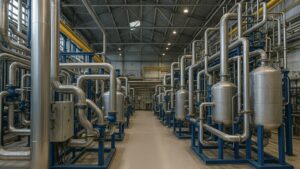It’s not a secret that companies need to decarbonize over the coming decades. Industry leaders are in an awkward position, where they must make far-reaching decisions in an ever-changing technological and legislative landscape. So it can be helpful to start from the basics and understand what will be needed to get to net-zero, and what are the possible risks and rewards.
What is Net-Zero
The simple answer? It’s the proposed goal of reducing all net carbon emissions to zero by 2050. Now, some will still exist, as operations, vehicles, and other things all end up creating some CO2. But as carbon capture and storage improve and offsetting becomes more effective, it is becoming increasingly possible to operate without any emissions. However, research has found that most smaller businesses do not yet even have a strategic plan. So it follows that they have not even started decarbonizing yet. So why have some companies not embraced this change yet?
The Costs of Net-Zero
In general, it’s costly. Very costly. Some analysts believe that it will end up costing US$275 trillion by 2050, or US$9.2 trillion per year on average, across just physical assets. It’s important to note that the labor and organization costs of managing, planning, and implantation aren’t even included here. Companies will need to assess options, and alternatives, train employees, analyze their entire value chain and keep track of emissions. This will likely add workload across the board.
Similarly, there are some risks associated with an aggressive move to net zero. While clean energy production can, in theory, bring more efficiency through lowered costs, it’s hard to predict the future energy market. Wind turbines need maintenance, solar panels need sunny days, and an above-average amount of disruption will end up creating issues down the line.
The Benefits of Net-Zero
Like it or not, decarbonization is here to stay. It is highly likely that there will be more regulation, including fines and fees for non-compliance, from governments. Companies ahead of the curve are likely to be less at risk and might save in the long run. If, suddenly, a government passes sweeping, powerful climate regulations, companies that were already down the road with their transition to net-zero will always save more than companies that need to overhaul large segments of their operations.
And it’s not just governments. Consumer awareness is growing and is unlikely to change, as the subject matter involves the survival of the earth. 32% of UK consumers have indicated that they would be willing to pay more for sustainable alternatives to most products. It’s not a stretch to say that consumers would also see non-sustainable businesses in a poor light. Similar to the aforementioned argument regarding regulations, companies that have embraced net-zero already will have an easier path to getting consumers on their side.
What should companies do?
Companies must assess their own impacts and emissions. Reporting, in one way or another, is already mandatory, so this data is being gathered. Businesses should and must intensify how they approach data gathering to know exactly where and how they can limit emissions. The technology is out there, but leaders need to investigate innovations to find the best way to maintain efficiency as they approach net-zero. It’s important to remember that no company is alone here, most businesses are developing their own roadmap for net zero. Communication and networking can be key to finding the best path forward.
The Global Summit on Scope 3 Emissions Reduction will bring together key industry experts to learn more about reporting strategies & carbon data management in a small-scale, industry-driven event, on 20-21st April 2023 in Amsterdam, the Netherlands. The two-day, hybrid event features in-depth case studies of supply chain transformation, carbon accounting, and networking breaks dedicated to exchanging insights and expertise on tackling Scope 3 emissions. Visit future-bridge.eu and netzero-events.com or follow us on our social media to track other energy use and decarbonization events.





